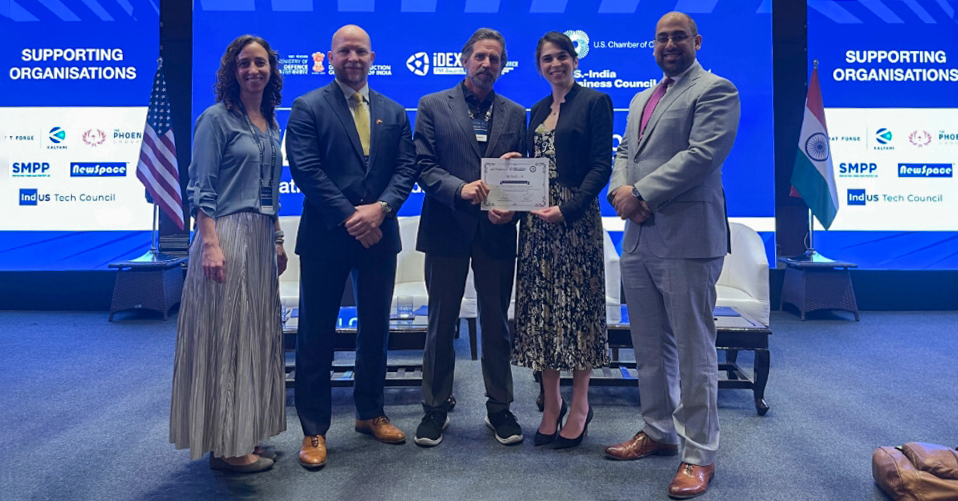
Startups Bolster Indian and American Binational Security through Joint Challenge Activity

Five startups with technologies that enable underwater communication or maritime intelligence, surveillance, and reconnaissance (ISR) received part of $300,000 USD available during the Defense Innovation Unit (DIU) and India-U.S. Defense Acceleration Ecosystem (INDUS-X) challenges.
These challenges were aligned with the Roadmap for U.S.-India Defense Industrial Cooperation. Startups in both countries will develop technological solutions for shared defense challenges. Potential procurement opportunities and further financial awards will be available for the most promising technologies.
The India-U.S. Defense Acceleration Ecosystem (INDUS-X) worked alongside with the National Security Innovation Network (NSIN), a program office in the U.S. Department of Defense, nested within the Defense Innovation Unit (DIU).
These challenges were also in partnership with U.S. Navy Third Fleet, Naval Information Warfare Center (NIWC) Pacific, the Naval Oceanographic Office (NAVOCEANO) and the U.S. Coast Guard Pacific Strike Team (USCG PST). Through this collaboration, these prize challenges identify new hardware and software technologies that can support national security.
“I have no doubt that these companies will bolster Indian and American binational security, improve outcomes for service members, and address modernization priorities for the DoD at-large,” said Abigail Desjardins, NSIN Venture Portfolio Director.
The winning ventures will use the funds to modify their innovations to fit end-user specifications for protecting the environment and furthering national security initiatives.
“The challenge provided a concrete problem statement and set of required features against which we could assess product-market fit. This information and the feedback from the Q&A session helped us correctly prioritize our R&D efforts,” explained Thomas Riedl, Chief Technology Officer of OceanComm, Inc., the winning venture of the Underwater Communications Challenge. “We were thrilled to receive the first place award and plan to deploy the proceeds towards the development of our next-generation products.”
iDEX Maritime Intelligence, Surveillance, and Recognizance (ISR) Challenge Winners
Technologies for detecting and tracking oil spills .
First Place Winner
Indian and U.S.-based startup Pixxel is a space technology company building several constellations of the world’s highest-resolution hyperspectral earth-imaging satellites and the accompanying analytical tools to mine insights from the data. The company uses commercial synthetic-aperture radar (SAR), including from NSIN alumni Capella Space, to detect spills in real time, then characterize spills by material, thickness, and total volume, and finally forecasting the evolution of the spills.
Second Place Winner
Indian and U.S.-based startup Piersight develops specialized airborne and spaceborne SAR-based imaging solutions for persistent ocean surveillance. Through its unique data and detection algorithms, the venture helps solve challenges related to illegal, unreported, and unregulated fishing, oil spill detection, and homeland security. The venture also provides insights to hedge funds and maritime insurance organizations for risk assessment, risk aggregation, and better visibility of commodities being traded through the ocean.
iDEX Underwater Communication Challenge Winners
Hardware and software technologies for supporting high-bandwidth underwater communication.
First Place Winner
OceanComm enables high-speed wireless connectivity underwater, offering orders of magnitude improvement in data rate. Legacy underwater wireless modems take about an hour to transfer a single picture while OceanComm’s modems can live-stream video. Most underwater vehicles today require a tethered link to a manned ship for remote control. OceanComm’s modems eliminate the need for manned surface support and instead allow operators to work at a safe distance or from shore, reducing costs by more than50%.
Second Place Winner
Sea-Gal Technologies Inc.
Sea-Gal Technologies is a startup that aims to transfer university research in advanced multiple-input multiple-output (MIMO) acoustic communication to fieldable products. The venture’s goal is to connect underwater to the internet. Its vision is to empower people to discover the beauty of the underwater world by transmitting video through underwater for in-volume to in-volume and surface to in-volume cases.
Third Place Winner
Bionet Sonar Inc. dba HydroNet
HydroNet brings the internet underwater and empowers it with artificial intelligence (AI)-driven software-defined technologies to enable real-time decision-making for both DoD and civilian applications. HydroNet’s Wideband Modular Modem (WMM) technology is a fully programmable platform that enables in-water communication, sensing, AI processing, and analytics. HydroNet’s WMM can realize Wi-Fi and Mesh Networks with acoustic, ultrasonic, and optical waves, which propagate much better in water than radio frequency (RF) waves. HydroNet is also an NSIN alumni.
Photo taken by DIU: Skip Masseli receiving a challenge award from DIU and NSIN on behalf of Pixxel Space.
About National Security Innovation Network
NSIN is a program office in the U.S. Department of Defense, nested within the Defense Innovation Unit (DIU). We are set up to collaborate with a wide variety of innovators to include universities, researchers, students, entrepreneurs and start-ups. We create opportunities for collaboration across communities and connect those that might not traditionally work in national security. Together, we help drive national security innovation and develop technologies that directly support the individuals responsible for protecting our country.
For more information or interview requests with Team NSIN, please contact us at media@nsin.mil.